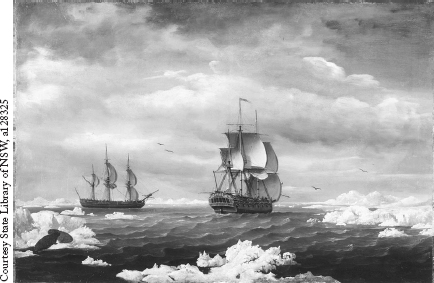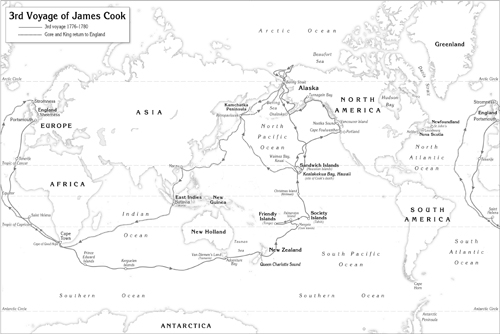Introduction
The year is 1775.
Recently returned from a triumphant three-year voyage around the world, his second circumnavigation, Captain James Cook RN is honoured by King George III and the Royal Society. Acclaimed by the Admiralty and the London public, he also has his portrait painted by Nathaniel Dance. The 47-year-old navigator can now look forward to a peaceful retirement in London with his wife Elizabeth and their three surviving sons. James is offered and takes up a paid position at Greenwich Royal Naval Hospital. Here he can write the account of his second world voyage. He settles in to this comfortable, secure way of life.
It is not enough. Looking out over the Thames, where every day he can see ships of the Royal Navy, James becomes deeply restless. He yearns to return to the sea. So when he is offered the command of an expedition to search for a ‘North-east Passage’, from the Arctic Ocean through to the Atlantic, he does not refuse.
Against the wishes of Elizabeth, who has just had their sixth child, James goes to sea again. This voyage takes him through the South Pacific, which he knows well, then to the north of the great ocean, which he does not. After discovering an archipelago which he names the Sandwich Isles, James takes his two sloops Resolution and Discovery on to the western coast of North America, through the Bering Strait and beyond the Arctic Circle.
Beset now by physical and mental illness, James is forced to return to another of the Sandwich Isles, called O-why-hee. Venerated by the people there, who have never seen Europeans before, James is hailed as ‘Lono’, one of their traditional gods. Tributes pour in from the island people, until it is time for Resolution and Discovery to return to the North Pacific and resume their search for the North-east Passage.
Fate intervenes. Damage to Resolution means the ships must return to O-why-hee. But things are now very different. Unwise decisions are made and hostilities break out—culminating in violent deaths on the fatal shore of Kealakekua Bay. And from now on the islands of the Pacific Ocean will never be the same.
As James Cook remarks prophetically to one of his officers, Lieutenant King:
‘It seems that having discovered a new world, we have been doomed to then lose it.’

Resolution and Discovery in the Arctic Sea, oil painting by Thomas Luny.
